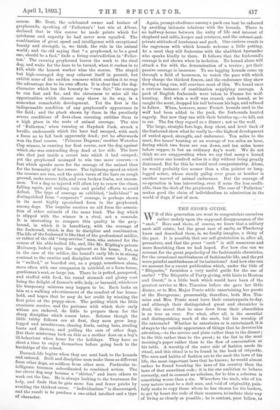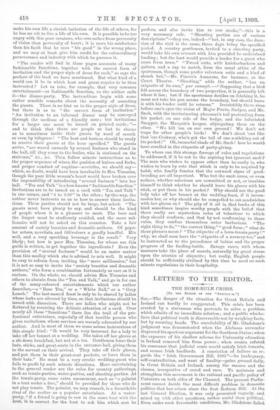THE SNOB'S GUIDE.
WE of this generation are wont to congratulate ourselves rather unduly upon the supposed disappearance of the "snob." Here and there, of course, we know that a solitary snob still exists; but the great race of snobs, as Thackeray knew and described them, is, we fondly imagine, a thing of the past. It is possible that our self-gratulation is, after all, premature, and that the genus "snob" is still numerous and more flourishing than we had hoped. For how else can we account for the great popularity of the fashionable chronicles, for the occasional snobbishness of fashionable life, and the yet more painful snobbishness of its imitations? And how else can we account for a recent publication which, under the title of "Etiquette," furnishes a very useful guide for the use of snobs P "The Etiquette of Party-giving, with hints to Hostess and Guest," is a little book which would have been of the greatest service to Mrs. Timmins before she gave her little dinner, or to Mrs. Major Ponto while entertaining her guests at the Evergreens; presumably, therefore, both Mrs. Tim- mins and Mrs. Ponto must have their counterparts to-day, and although their distinguished guest and chronicler is dead, the moral that he once drew from their absurdities is as true as ever. For what, after all, is the essential and distinguishing mark of the snob, but his worship of the externals P 'Whether he entertains or is entertained, it is always to the outside appearance of things that he devotes his attention,—to the service and plate rather than to the dinner ; to the title rather than to the guest ; to the list in the next morning's paper rather than to the flow of conversation at his table. A worship of the outer side of fashion needs its ritual, and this ritual is to be found in the book of etiquette. The uses and habits of fashion are to the snob the laws of his life, the most important laws that he knows ; he would almost rather be found breaking the laws of his country than the laws of that unwritten code; it is his one ambition to behave correctly, and to commit no solecism, for to him a solecism is something worse than a sin. Wherefore the snob, who of his very nature must be a dull man, and void of originality, pain- fully seeks to copy those whom he has chosen for his leaders, to get by heart the code of their manners, to imitate their way of living as closely as possible ; he is content, poor fellow, to make his own life a slavish imitation of the life of others, for he has no wit to live a life of his own. It is possible to be too angry with this poor creature, who errs rather from perversity of vision than perversity of heart ; it is more his misfortune than his fault that he sees "his good" in the wrong place, and we may at least give him credit for the extraordinary perseverance and industry with which he pursues it.
"The reader will find in these pages accounts of many fashionable functions, together with the correct form of invitation and the proper style of dress for each," so says the preface of the book we have mentioned. But what kind of a world can it be in which host and guest require to be thus instructed ? Let us take, for example, that very common entertainment—or fashionable function, as the author calls it—the dinner-party. The instructions begin with some rather sensible remarks about the necessity of assorting the guests. There is no hint as to the proper style of dress, but there is as to "the correct form of invitation." "An invitation to an informal dinner may be conveyed through the medium of a friendly note ; but invitations for a larger one must be issued on printed cards ; "- and to think that there are people so lost to shame as to sometimes invite their guests by word of month or even by telegram! "The host and hostess should be ready to receive their guests at the hour specified." The guests arrive, "are waved onwards by several footmen who stand in the hall, till they come to the butler, who is stationed on the staircase," Ste., 44.-o. Then follow minute instructions as to the proper sequence of wines, the position of knives and forks, and proper conduct of napkins—serviettes, we should say— which, no doubt, would have been invaluable to Mrs. Timmins, though the poor little woman's heart would have broken over the impossibility of introducing "several footmen" into her hall. "Tea and Talk "is a less-known" fashionable function." Invitations are to be issued on a card with "Tea and Talk" in one corner, and "4 to 6.30" in the other; by-the-way, the author never instructs us as to how to answer these invita- tions. These parties should not be large, but select. "The guests must have plenty to say, and should be the kind of people whom it is a pleasure to meet. The bore and the limpet must be studiously avoided, and the mere mil- lionaire will not be asked on this occasion. Take a fair amount of society beauties and dramatic authors. Of popu- ]ar actors, novelists, and litgrateurs a goodly handful. Mix well, and a very sparkling beverage is the result." Very likely ; but how is poor Mrs. Timmins, for whose use this guide is written, to get together the ingredients ? Even the provision of "several footmen" would be an easier matter than this medley which she is advised to mix well. It might be easy to refrain from inviting the "mere millionaire," but it is not so easy to invite the "society beauties and dramatic authors," who form a combination fortunately as rare as it is curious. On the whole, we should advise Mrs. Timmins and others to abstain from the "Tea and Talk," and go in for one of the many-coloured entertainments which our author describes,—a "Rose Tea," or a "White Ball," or a "Grey Lunch." The last-named feast is only to be shared by ladies whose locks are silvered by time, so that invitations should be issued with discretion. There are ladies who might not be flattered by receiving the delicate attention of a card. Over nearly all these " functions " there lies the trail of the pro- fessional entertainer, especially of that terrible person who gives recitations, whose services are warmly advocated by our author. And in most of them we come across instructions of this simple kind : "It would be very incorrect for a lady to take off her bonnet at a wedding. She takes off her gloves at a sit-down breakfast, but not at a tea. Gentlemen leave their hats, sticks, and great-coats in the entrance-hall, giving them to the servant on their arrival. They take off their gloves, and put them in their great-coat pockets, or leave them in their hats." He must be a very erratic wedding-guest who fails to profit by such minute directions. More entertaining to the general reader are the rules for country gatherings, such as tennis-parties, water-parties, and shooting-parties. At the tennis-party, some extra amusement, such as "a palmist in a tent under a tree," should be provided for those who do not play tennis. The palmist, we may remark, is a formidable rival of the reciter as a popular entertainer. At a water- party, "if a friend is going to row in the same boat with the host, it is correct for the host to ask him which seat he prefers, and also invite him to row stroke,"—this is as very necessary rule. " Shooting parties are of various descriptions "—they are, indeed—" but, in any case, the dura- tion of the visit is the same, three days being the specified period. A country gentleman, invited to a shooting party, would take his own servant with him provided he understood loading ; but the host would provide a loader for a guest who- came from town." "Tweed suits, with knickerbockers and gaiters, and a cap to match, form the usual attire of the sportsman, though some prefer velveteen suits and a kind of slouch hat,"—Mr. Pinero's Amazons, for instance, at the Court Theatre. "Shooting," adds the author, "has an etiquette of its own," par example :—" Supposing that a bird fell across the boundary of two properties, it is generally left- where it lies; but if the sportsman decides on fetching it, he must not take his gun across the boundary, but should leave it with his loader until he returns." Irresistibly there rises. before one's eyes the vision of Major Ponto, Stripes, and Mr. Snob, with the incriminating pheasant's tail protruding from his pocket, on one side of the hedge, and the infuriated Snapper, the Marquis's keeper, ohjurgating them on the other. "We kill 'em on our own ground ! We don't set. traps for other people's birds ! We don't shoot 'ens like. that 'ere Cockney, who's got the tail of one a-sticking out of his pocket " Oh, immortal shade of Mr. Snob ! how he would have revelled in the etiquette of party-giving.
To whom can this strange farrago of rules and regulations be addressed, if it be not to the aspiring but ignorant snob P' The man who wishes to appear other than he really is, who. wishes to learn by rote that which is only to be acquired by habit, who fondly fancies that the outward signs of good- breeding ate all important. Who but the snob cares, or even, notices, whether solecisms are committed or not, or troubles himself to think whether he should leave his gloves with his- stick, or put them in his pocket ? Why should not the good lady take off her bonnet at the wedding-feast, if it incom- modes her, or why should she be compelled to eat sandwiches with her gloves on ? The pity of it all is, that books of this kind sometimes inspire worthy people with the belief that there really are mysterious rules of behaviour to which, they should conform, and that by not conforming to these rules, they confess themselves outer barbarians. " The. right thing to do," "the correct thing,"" good form ;" what do these phrases mean ? "The etiquette of a lawn-tennis party! why, we shall soon have the "etiquette of a nursery-tea," and be instructed as to the precedence of babies and the proper progress of the feeding-bottle. Savage races, with whom. manners take the place of morals, naturally lay great stress upon the niceties of etiquette; but really, English people should be sufficiently civilised by this time to need no such minute regulations in their hospitality.



































 Previous page
Previous page